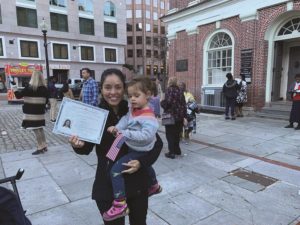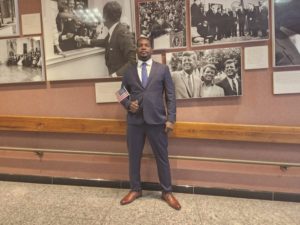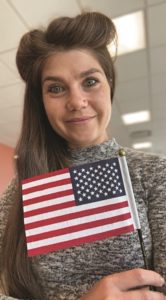“I had never pictured myself living in the U.S.,” said Sandra Paredes, who grew up in Colombia. But then she fell in love with an American man, and it made the most economic sense for the couple to live in the States.

Paredes moved in 2016 to Wellfleet, where she works from home managing logistics for her husband Mike Ryan’s Boston-based business, Bridge Import Group. She started pursuing naturalization last summer, and she became a U.S. citizen at Boston’s Faneuil Hall on Nov. 10.
The ceremony, Paredes said, was joyous. The judge who presided listed all the countries of origin of the more than 200 new citizens that day. “We the people…” the judge recited from the preamble to the U.S. Constitution, she recalled, before turning to the newly naturalized: “That’s you now,” he said.
Paredes at first considered citizenship little more than a convenience — a way to avoid the hassle of having to renew her “green card” (an official permanent resident card) every 10 years. But after she had a baby, she said, she realized she wanted to share a national identity with her daughter, Mariapaz Ryan, who’s now two and a half. Mariapaz was born here and has only U.S. citizenship.
Nationally, 809,100 new citizens were naturalized in fiscal 2021, according to U.S. Citizenship and Immigration Services, and 2.9 percent of them live in Massachusetts, making it the state with the fifth highest percentage of new citizens.
Early last summer, Paredes sent in the initial paperwork including documentation of her life here: wedding photos, pictures of her with her husband and daughter. When the letter arrived notifying Paredes that she’d qualified for an interview, she felt a wave of excitement that surprised her.
Until that moment, she said, her emotions about becoming a citizen had been “unconscious.” The letter, she said, “made me feel that I would belong more in this place.”
The citizenship interview, following background and security checks, includes a civics test. Those who qualify are given a list of 100 questions to study — about the Constitution, branches of the federal government, term limits, and federal authority. Questions range from “What is freedom of religion?” (Answer: “You can practice any religion, or not practice a religion”) to “What territory did the United States buy from France in 1803?” (“the Louisiana Territory” or “Louisiana”). In the interview, 10 questions are randomly selected, and the interviewee must answer six of them correctly to pass.

The interview was “nerve-wracking,” said Burchelle Edwards, who passed the test on Sept. 27. “I took two solid days off with no interruptions just to study.” Edwards works at the Wellfleet Shellfish Company.
The first question was easy, Edwards said, but “I could not get the answer out for 20 seconds.” His tongue-tied-ness was temporary. He rattled off the answers after that and was asked only six questions because he answered them all correctly.
Edwards grew up in Jamaica and has lived in Wellfleet since 2010. He had a conditional green card at first, which took about a year and a half to procure. It had to be renewed every two years. When he got his permanent green card in 2014, he was able to leave the country again.
Citizenship makes entering and leaving the U.S. easier. Still, “Living in Wellfleet, I pretty much feel like I’m at home,” Edwards said, “so it’s not like I was longing for Jamaica.” He was, however, eager to see his daughter, Kizzyandry, who lives there, more regularly.
That feeling that Cape Cod is home was echoed by Lana Vasileva, who grew up in Bulgaria and became a U.S. citizen on Oct. 27. “For a couple years now I’ve really, really felt like I’m home,” she said. “And this is a confirmation of that feeling.”

Vasileva came to the U.S. on a J-1 visa for the first time in the summer of 2010. She returned as a student for four years, then lived here under two working visas and a tourist visa before marrying her wife, Stephanie Leonard, a U.S. citizen. Vasileva started the process of acquiring a green card shortly afterward. Vasileva and Leonard recently celebrated their fifth anniversary.
Vasileva lives in Provincetown and works as a server at the Red Inn. Her goal is to enroll in the nursing program at Cape Cod Community College. “It still feels a bit surreal” to be a citizen, she said. “I’ve been living in this country for most of my adult life, and I definitely see my future here.”
The decision to naturalize, for each of these new Outer Cape citizens, had to do with community and the feeling of belonging to it, as Paredes put it.
“I’m surrounded by good people here,” Edwards said. And besides, he added, he’s felt markedly more at ease in the weeks since becoming a citizen. Before that, immigration bureaucracy was always on his mind, he said.
“Since that’s over with, it’s like a lot of pressure has come off my brain.”



